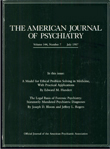Effectiveness of community-based screening for depression
Abstract
OBJECTIVE: The effectiveness of a voluntary depression screening program was assessed by determining 1) whether participants in the 1994 National Depression Screening Day went for recommended follow-up examinations and 2) the characteristics that differentiated those who did and did not return. METHOD: Randomly selected participants (N = 1,169) from 99 facilities completed a follow-up telephone survey. RESULTS: Of 805 people for whom follow-up was recommended, 56.5% (N = 455) went for an appointment. The severity of depressive symptoms in these subjects ranged from severe (33.4%, N = 152) and marked (41.3%, N = 188) to minimal (17.1%, N = 78) and normal (8.1%, N = 37). Subjects with marked or severe depression were more likely to respond to the screening recommendation than were those with minimal depressive symptoms. However, at each level of symptom severity, subjects who had received previous treatment were more likely to adhere to the screening recommendation than were those with no previous treatment. Of those who returned for a recommended follow-up, 72.1% were diagnosed with depression. Of those who did not return, 29.5% cited lack of insurance, under insurance, or inadequate finances, and 38.0% felt they could "handle" depression on their own. CONCLUSIONS: Voluntary screening for depression is an effective way to bring certain untreated depressed individuals to treatment. Inadequate insurance and the belief that individuals can manage depression on their own continue to be barriers to seeking treatment among some depressed individuals who attend a depression screening program.



